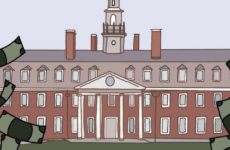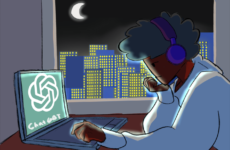For the longest time, I thought Asians existed in a special realm of racial identity. Asians weren’t white, I knew that. But I also knew that they weren’t black, Hispanic, or Native American. As a Korean in the United States, I was a minority, sure, but I was never asked to consider myself a “person of color.” What category did I belong in?
When I came to Choate, I didn’t think once to call myself a student of color. I knew other minorities–non-Asian minorities–had faculty resources on campus. C. Lord was the guy all my friends of color talked about. But I would never speak a word to C. Lord (who left the school in 2014), not out of choice but out of categorical circumstance.
Later, it was Mr. Bynum and Mr. McCatty. I never wondered why I, and other Asian students, weren’t part of this group, this illusive gathering of “students of color.” Without realizing it, I slowly became comfortable with being a present but forgotten minority.
I don’t remember when I first had the eureka moment of realizing that I, too, on the basis of not having white skin, should be a student of color. Maybe it was less of a eureka moment and more of a slow wave rolling onto the shore, bumping against me as I entered my junior year. It was August of 2014 when I became conscious of race. As I watched the Ferguson protests and everything else, I started thinking about who I was—a pale yellow question mark of biracial confusion.
Today, I comfortably, perhaps even preferably, identify as a student of color, but I know that many of my Asian peers don’t, not because they don’t want to but because they don’t know to. How would we? We are the “model minority,” the residents of a well-considered, but overlooked Other (Asian) America. I have to admit, being a model minority sometimes makes me guilty. It seems selfish, unfair even, to demand that I be part of a group of students of color when in many ways, Asians are thriving in this country. Asian-Americans lead other racial groups, including whites, in income and education. Asian-Americans are disproportionally represented in universities, and the average Asian-American woman earns more than the average white woman to every white man’s dollar.
Yet, it isn’t perfect. We are often unseen on television, in the movie theater, and in the halls of Congress. We suffer from “positive stereotyping,” the kind of stereotyping that can be disguised as a compliment, but really serves to diminish Asian-Americans to nothing else but caricatures–friendly Mr. and Mrs. Ching-Chong-Changs who know nothing but their textbooks, have hard-working parents who run laundromats or restaurants, and are sent to their graves if they get anything less than an A+.
These are the kind of things that we don’t truly address as a community. It’s as if someone once looked at the raw numbers, decided that Asians are doing all right on their own, and, thus, don’t need to be heard. This is as ridiculous as saying that having a black president means that the community no longer needs to engage with black issues, or that the legalization of same-sex marriage means that SMASS no longer serves a purpose.
I wish we had a vocal Asian affinity group on campus, I really do. There are issues brewing beneath the pristine surface of the model minority label and it shocks me that we haven’t acted on this yet. That’s a step that we, as Asian students on this campus, have to take. But the burden of making ourselves heard and making a space for our issues shouldn’t entirely be on us. The first step is recognizing Asians students as students as color, affirming that there is a space of Asians among other minority students on campus. Many Asian students aren’t race-conscious because they’ve become used to a society that is entirely comfortable forgetting their existence. This doesn’t mean that things should stay this way. If we as a society want to be an engaged and inclusive community, it means giving Asians their place at Choate. I shouldn’t be treated as an in-betweener. No other Asian on this campus should be either.




